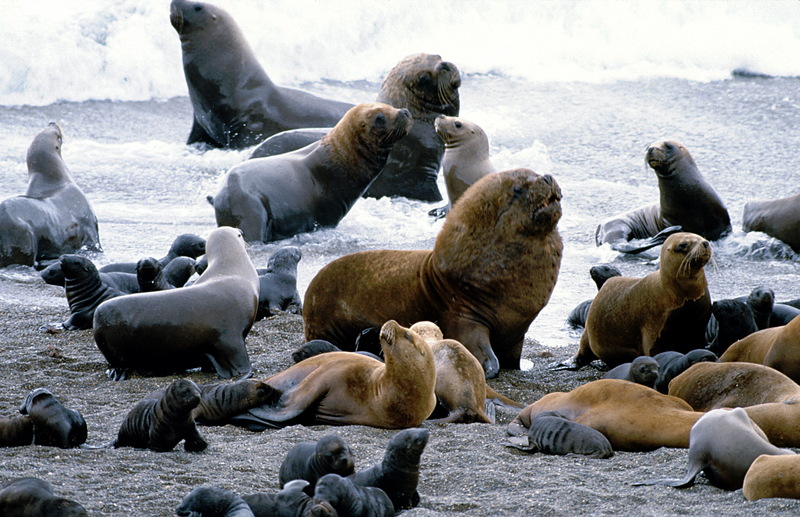|
Southern or South American Sea Lion (Otaria flavescens) - Wiki
| 제목: | Southern or South American Sea Lion (Otaria flavescens) - Wiki
| |

| 해상도: 2126x1374
파일크기: 1213454 Bytes
촬영일: 2007:12:21 10:11:40
등록시간: 2007:12:21 10:12:54
|
South American Sea Lion
From Wikipedia, the free encyclopedia
Order: Carnivora
Suborder: Pinnipedia
Family: Otariidae
Subfamily: Otariinae
[Photo] South American Sea Lion (Otaria flavescens). Peninsula de Valdes. Date created: January 1984. Author: Reinhard Jahn, Mannheim. Source: http://en.wikipedia.org/wiki/Image:Lobo-001.jpg
The South American Sea Lion or Southern Sea Lion (Otaria flavescens, previously Otaria bryonia) is a sea lion found on the Chilean, Peruvian, Uruguayan and Argentine coasts. It's scientific name was subject to controversy, with some taxonomists referring to it as Otaria flavescens and other referring to it as Otaria byronia. The former eventually won out.
Physical description
The South American sea lion is perhaps the archetypal sea lion in appearance. Males have a very large head with a well developed mane making them the most lionesque of the eared seals. Both males and females are orange-coloured with upturned snouts. The manes on males are lighter than females, and female fur on the head and neck is lighter than that of males. Pups are born black or dark brown and molt into a more chocolate colour. The South American Sea Lion's size and weight can vary quite a lot. Adult males can grow up to 2.6 m (8 ft 6 in) and weigh up to 300 kg (660 lb). Adult females grow up to 1.8???2 m (6???7 ft) and weigh about half the weight of the males, around 150 kg (330 lb). These sea lions are the most sexually dimorphic of the five sea lion species.
Foraging
South American sea lions feed on a variety of fish including Argentine hake and anchovies. They also eat cephalopods, such as shortfin squid, Patagonian squid and octopus. They have even been observed preying on penguins and young South American Fur Seals.
South American sea lions normally hunt in shallow waters less then five miles from shore. They often forage at the ocean floor for slow moving prey but they will also hunt schooling prey in groups. When captured, the prey is shaked violently and torn apart. The sea lions themselves are hunted by orcas, sharks and cougars.
Lifestyle and reproduction
South American sea lions prefer to breed on beaches made of sand, but will breed on gravel, rocky or pebble beaches as well. They can also be seen on flat rocky cliffs with tidepools. Sea lion colonies are more scattered on rocky beaches than sand, gravel or pebble beaches. The colonies make spaces between each individual when it is warm and sunny.
Mating occurs between August and December and the pups are born between December and February. Breeding groups can consist of up to 18 females with one to several males. Males maintain their boundaries by barking, roaring and other vocalizations. The males herd the females into their territories and prevent them from leaving until mating is over. Actual fights between males occur depending on the number of females in heat. During these times, group raids often happen and the pups are abducted by the invading males as an attempt to control the females.
Female sea lion mothers have a routine of taking trips back into the sea for food and come back to nurse the pups. Pups first enter the water at about 4 weeks and are weaned at about 12 months. This is normally when the mother gives birth to a new pup.
Conservation
South American sea lions were greatly hunted in the 19th and 20th centuries. The hunting has since gone down and the species is no longer threatened and are protected in most of their range. However, they have declined in numbers in the Falkland Islands and they still are killed due the sea lions' habits of stealing fish and damaging fishing nets.
http://en.wikipedia.org/wiki/South_American_Sea_Lion
| The text in this page is based on the copyrighted Wikipedia article shown in above URL. It is used under the GNU Free Documentation License. You may redistribute it, verbatim or modified, providing that you comply with the terms of the GFDL. |
|
^o^
동물그림창고 똑똑전화 누리집
^o^
|
|